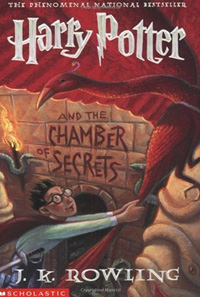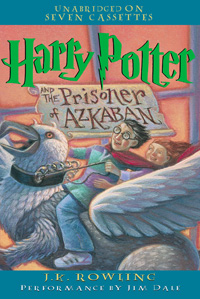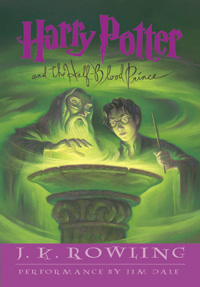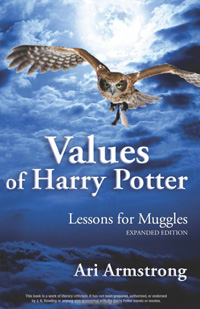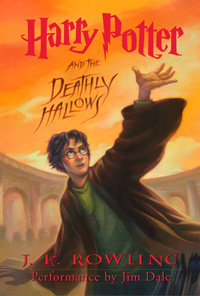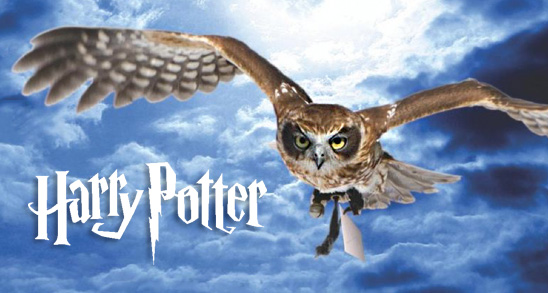
About this week’s feature article
In light of the final installment of the übersuccessful Harry Potter series hitting theaters in two days, we present Ari Armstrong‘s examination of religion in J. K. Rowling’s novels.
Ari Armstrong is the author of Values of Harry Potter: Lesson for Muggles, Expanded Edition (Ember Publishing, 2011). He writes the Free Colorado blog and coauthors a column for Grand Junction Free Press.
SUBSCRIBE to Skeptic magazine for more great articles like this one.
Religion in Harry Potter
Do J. K. Rowling’s novels
promote religion or undermine it?
by Ari Armstrong
Given the runaway popularity of J. K. Rowling’s novels and the related films, readers of the works, parents of readers, and those interested in cultural trends may wonder about the religious themes of the stories. Do the novels promote sorcery, as some conservative Christians allege? Do they instead endorse Christian notions of immortality, recapitulate the story of Christ’s sacrificial love, and promote religious faith? Or is it a mistake to read any religious theme into these fantasy stories?
Widely reported criticisms allege that Rowling’s novels undermine Christianity and promote occultism. A representative of Focus on the Family acknowledged that the novels offer “valuable lessons about love and courage and the ultimate victory of good over evil”; however, “the positive messages are packaged in a medium—witchcraft—that is directly denounced in scripture.”1 Other Protestant critics have been even less forgiving; a woman in the documentary film Jesus Camp said, “Had it been in the Old Testament, Harry Potter would have been put to death.”2 While some Catholic leaders have praised the novels’ moral themes, others have castigated the books. Before he became Pope, Joseph Ratzinger said the books threaten to “corrupt the Christian faith,” while another Catholic commentator said the novels promote the occult and Gnostic-like (heretical) “secret knowledge.”3
Rowling called the claims that her works promote witchcraft or the occult absurd.4 Attorney and political writer Dave Kopel likens Rowling to C. S. Lewis, an author revered by many Christians even though his fantasy novels also contain magic.5
Rowling’s novels, while brimming with magic, clearly separate the fantasy world from the real one. The ability to do magic is akin to a genetic trait; some people are born with it, some are not. Those born without magic, called Muggles, can never cast spells or employ a wand. In these stories, magical and nonmagical worlds coexist, but they remain separated by a wizard segregation law.6 More important, Rowling distinguishes the magic of her wizard world from a deeper sort of “magic” available to us all. Consider the comments of Harry’s mentor Dumbledore about the villain Voldemort, an expert in dark magic: “Of house-elves and children’s tales, of love, loyalty, and innocence, Voldemort knows and understands nothing. …That they all have a power beyond his own, a power beyond the reach of any magic, is a truth he has never grasped.”7 It is a truth that apparently eludes some of Rowling’s critics, too.
Far from undermining Christianity, Rowling’s novels promote important Christian themes, starting with immortality. In a 2007 interview Rowling said she believes in Christianity and attends a Protestant church.8 While she struggles with the idea of immortality, she said, “I do believe in life after death.”9
The heroes of Rowling’s novels explicitly endorse a belief in immortality. For example, Hermione, Harry’s bookish friend, explains to another friend, “Look, if I picked up a sword right now…and ran you through with it, I wouldn’t damage your soul at all. …Whatever happens to your body, your soul will survive, untouched.” She also says that “defeating death” in the positive sense means “living after death,” as opposed to attempting earthly immortality as Voldemort does. Significantly, she says this at the grave of Harry’s parents on Christmas Eve, and she magically creates “a wreath of Christmas roses” to place on the grave.10
A belief in the immortal soul is not unique to Christianity—Plato also maintained such a belief—but it does presume supernaturalism. Thus, while the endorsement of immortality in Rowling’s novels does not by itself make the novels distinctly Christian, it does promote a religious belief compatible with Christianity.
We may ask, though, how central a role does immortality play in the themes of the novels? Do the characters’ actions hinge on that belief? No doubt one of Voldemort’s major motivations is his pathological fear of death. Because of this fear he seeks total control over others, going so far as to murder people to create magical objects to protect himself. By contrast, the heroes are not strongly motivated by their belief in immortality. Instead, they fight to preserve their lives, the lives and safety of their loved ones, and their ability to live and work in peace, free from tyrannical oppression.
The heroes put themselves in harm’s way, not because a belief in an immortal soul alleviates their fear of death, but to protect their most cherished values. Harry’s godfather says the heroes fight Voldemort because “there are things worth dying for.”11 And the image of one of Harry’s mentors appears to Harry after being killed in that fight. He says, “I am sorry…I will never know [my son]…but he will know why I died and I hope he will understand. I was trying to make a world in which he could live a happier life.”12 So, while the novels clearly show a pathological fear of death can foster corruption, they do not demonstrate that virtue or heroism depend on a belief in immortality.
While Rowling believes immortality transcends her fantasy world, within the novels that religious belief remains entangled with the fantasy. In the stories, Hermione, often the skeptic, sees direct evidence of incorporeal souls. Ghosts regularly float through their school and converse with the students. A ghost even tells Harry that, while he chose to “remain behind,” usually spirits “will have…gone on.”13 In real life readers cannot commune with the dead, and they may reasonably conclude that immortality and incorporeal souls remain pure fantasy, along with the magic wands and spells.
In addition to the theme of immortality, the novels present the religious ideal of sacrificial love. The climax of the novels, with its complex backstory, seems to epitomize that theme. When Harry is an infant, Voldemort murders Harry’s parents and tries to murder Harry. The love of Harry’s mother Lily protects him from Voldemort’s magic, leaving Voldemort seriously weakened. However, through this clash Voldemort loses a piece of his soul—and it attaches itself to Harry, giving him a scar on his forehead. (This again invokes the idea of an incorporeal soul.) In the final book, Voldemort again tries to kill Harry, and again he fails because of the residual protection of Lily’s love. However, Harry believes he faces death in confronting Voldemort, and he intends to give his own life in order to destroy Voldemort and save his friends and allies. Moreover, after Harry suffers Voldemort’s curse he appears dead for a time and enters a sort of purgatory. Surely this bears some comparison to Christ’s sacrificial act, but how close of a comparison?
To John Granger, a Christian apologist for Rowling’s work, Harry’s apparently sacrificial act “points to Christ’s sacrifice on the Cross.” Harry “has died to the evil within him, and freed from this very real burden, he can (to risk using Christian language) be ‘born again.’” Granger continues, “Harry survives, but only because of the bond of blood he has with the person whose sacrificial death long ago saved him from the Dark Lord. The Christian echo here rings out….” Granger worries about drawing too close of a comparison; “Harry is no saint—and no Jesus, either.” But “his choices must be the same as Christ’s.”14
I do not doubt that Rowling intended a comparison to Christ’s death in the acts of both Lily and Harry. (Dumbledore’s death invites the same comparison.) Yet, in their motivations and in the context of their choices, Rowling’s heroes differ substantially from Jesus. God sent Jesus to die for everyone, however depraved, based on the idea that blood sacrifice atones for sin. Lily, on the other hand, tries to save her most cherished value—her son—from a particular aggressor. She has no wish to die, and certainly not for her enemies. Harry’s alternative to facing Voldemort is not to remain in some blissful Heaven, but to watch Voldemort continue to destroy the world he loves, systematically murder his friends and allies, and relentlessly seek to kill him—or, worse, to accept the yoke of Voldemort’s brutal dictatorship. As I argue in my book Values of Harry Potter, even in risking their lives Rowling’s heroes “struggle to defend the values that give their own lives meaning.”15
Rowling’s heroes typically do not sacrificially “turn the other cheek,” as Jesus advises; instead, when Harry’s surrogate mother Molly Weasley sees an enemy attacking one of her children, she counterattacks with a lethal curse, screaming, “Not my daughter, you bitch!”16 Indeed, I have argued that the actions of the heroes come closer to the moral ideals of rational self-interest as presented by Aristotle and Ayn Rand than they do to Christianity or its secular offshoots that exalt self-sacrifice.17
If Rowling’s themes of immortality and sacrificial love only ambiguously and half-heartedly endorse Christian ideals, what about her treatment of free will and faith?
Rowling’s heroes endorse free will; for example, Dumbledore says, “It is our choices, Harry, that show what we truly are, far more than our abilities.”18 The concept of free will underpins the development of several of Rowling’s major characters, including Harry, Voldemort, and Dumbledore. Does this view of free will tie in with novels’ supernaturalism and incorporeal souls? Is free will itself a sort of magic resulting from our spiritual ghosts interacting with our material bodies?
Various scientists and atheists suggest that free will is an illusion.19 But other scientists and atheists regard free will as introspectively demonstrable and see basic self-determination as the foundation of morality as well as rational thought.20 Likewise, some Christians believe in free will, others do not. The concept as developed in Rowling’s novels could fit a variety of different theoretical underpinnings, both religious and secular. Therefore, while some might presume a treatment of free will must imply a religious background, in general and in the case of Rowling’s novels it does not.
Does Rowling endorse faith over reason? For the most part Rowling’s heroes display fiercely independent and critical thinking. For example, when the Minister of Magic asks Harry to play along with the Ministry’s propaganda campaign, Harry tells the Minister he wants no part of the plan.21 In Divination class, Hermione finally gets fed up with the teacher’s arbitrary pronouncements, mocks the teacher, and storms out of the class, never to return.22 True, in the final book Harry decides “simply to trust” Dumbledore’s advice; “[h]e had no desire to doubt again.”23 John Granger sees such lines as constituting “an argument for the choice of religious belief.”24
I see Granger’s conclusion as strained. Harry chooses to trust the advice of an actual person with demonstrated reliability and concern for Harry’s regard. In the face of difficult decisions, Harry chooses to trust Dumbledore so that he can devote his energies to fighting Voldemort. As any leader in a war or emergency realizes, sometimes it is better to make a decisive choice based on limited information than to sit around bewailing the uncertainty. Harry’s trust in Dumbledore, whom he personally knew for several years, differs fundamentally from religious faith in a supernatural being or ancient religious text, accepted apart from physical evidence.
What, then, is the reader ultimately to make of the religious themes of the novels? Rowling does promote the Christian ideas of immortality and Christ-like love, but her efforts in these matters seem half-hearted and conflicted. (Rowling’s novels do not support a religious conception of free will or faith.) While some readers interpret the novels as fundamentally religious works, the events of the stories suggest the religious elements appear as vestigial features of a Christian faith that plays little role in the motivation of the heroes. While some Christians mistake the significance of the magic of the novels, wrongly linking it to occultism, others overstate the importance of the religious elements.
Ultimately the novels’ nonreligious themes drive the stories, showing great heroes fighting for their values, struggling against oppression and bigotry, and seeking self-reflective virtue. Rowling weaves these themes into vivid coming-of-age stories with lifelike and compelling characters. This is why the novels have attracted a tremendous worldwide following, regardless of readers’ cultural or religious background.![]()
References
- Kurtz, H. 1999. “Harry Potter Expelled from School.” Rocky Mountain News, November 6, p. 6A. (Wikipedia proved helpful in tracking down this citation as well as those of notes 3, 4, and 8.)
- Armstrong, A. 2011. Values of Harry Potter (expanded ed.). Denver: Ember Publishing. p. 10. (For additional information about the documentary, see http://www.jesuscampthemovie.com/.)
- Phan, T. 2008. “Vatican Slams Harry Potter as ‘Wrong Kind of Hero.’” Christian Today, January 16 (accessed July 3, 2011).
- CNN, 1999. “Success of Harry Potter Bowls Author Over.” CNN Entertainment, October 21 (accessed July 3, 2011).
- Kopel, D. 2003. “Deconstructing Rowling.” National Review Online, June 20, (accessed July 3, 2011).
- See Armstrong, A. pp. 115–19.
- Rowling, J. K. 2007. Harry Potter and the Deathly Hallows. New York: Scholastic Press. pp. 709–710.
- de Rek, W. 2007. “J. K. Rowling.” Volkskrant, November 17 (accessed July 3, 2011).
- Petre, J. 2007. “J. K. Rowling: ‘Christianity Inspired Harry Potter.’” Telegraph, October 20 (accessed July 3, 2011).
- Rowling, J. K. 2007. pp. 104, 328–29.
- Rowling, J. K. 2003. p. 477.
- Rowling, J. K. 2007. p. 700.
- Rowling, J. K. 2003. p. 861.
- Granger, J. 2008. How Harry Cast His Spell. Carol Stream, IL: Tyndale House. pp. 233, 240–41.
- Armstrong, A. p. 77.
- Rowling, J. K. 2007. p. 736 (emphasis removed).
- Armstrong, A. pp. 24–27, 71–85.
- Rowling, J. K. 1999. Harry Potter and the Chamber of Secrets. New York: Scholastic Press. p. 333.
- E.g., Harris, S. 2011. “Free Will (And Why You Still Don’t Have It).” Sam Harris, May 31 (accessed July 3, 2011).
- E.g., Rand, A. 1979. Introduction to Objectivist Epistemology. New York: Meridian. p. 110.
- Rowling, J. K. 2005. Harry Potter and the Half-Blood Prince. New York: Scholastic Press. pp. 345–47.
- Rowling, J. K. 1999. Harry Potter and the Prisoner of Azkaban. New York: Scholastic Press. p. 298.
- Rowling, J. K. 2007. p. 563.
- Granger, J. pp. 206–207.


